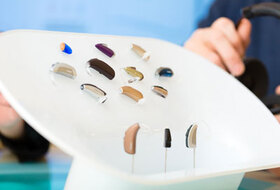FDA issues final rule opening the market to over-the-counter devices, broadening choices for millions of Americans who need hearing help Millions of American adults with mild to moderate hearing loss will soon have more choices in hearing aids, and the ability to get them without seeing a doctor or hearing care professional. The OTC option may inspire some people to get help earlier in the process, when they notice hearing changes in certain situations. These hearing aids are recommended only for adults with mild to moderate hearing loss.
Hearing aids can mean a better quality of life, and avoiding the increased risk of dementia, falls and isolation associated with untreated hearing loss. Forty-eight million Americans have hearing loss, and most ever get diagnosed or treated. Cost and stigma are common barriers, even though untreated hearing loss is linked with other serious illnesses, isolation and even poor job performance, and hearing loss is often progressive, OTC hearing aids will be significantly less expensive than those currently on the market which can average thousands of dollars a pair.
HLAA advocated for much of the consumer protection pieces of the long-awaited FDA rule, including a clear return policy and labeling on cell phone connectivity. HLAA is providing free resources if you are considering over-the-counter hearing aids. It’s still to remember there’s no one-size-fits-all approach to hearing loss. For many, a hearing care professional will still be a part of an effective treatment plan. For OTC resources, click on hearingloss.org/OTC.
OTC Hearing Aids: Returns – a key piece of the puzzle
What should you take into consideration as you begin the search for an OTC hearing aid?
One major key to success is a good return policy, which the FDA did not require in its rule released August 16. So, it’s up to the consumer to check this critical feature. Why is it so important?
It’s still to remember there’s no one-size-fits-all approach to hearing loss. For many, a hearing care professional will still be a part of an effective treatment plan.
Hearing aids can mean a better quality of life, and avoiding the increased risk of dementia, falls and isolation associated with untreated hearing loss. Forty-eight million Americans have hearing loss, and most ever get diagnosed or treated. Cost and stigma are common barriers, even though untreated hearing loss is linked with other serious illnesses, isolation and even poor job performance, and hearing loss is often progressive, OTC hearing aids will be significantly less expensive than those currently on the market which can average thousands of dollars a pair.
HLAA advocated for much of the consumer protection pieces of the long-awaited FDA rule, including a clear return policy and labeling on cell phone connectivity. HLAA is providing free resources if you are considering over-the-counter hearing aids. It’s still to remember there’s no one-size-fits-all approach to hearing loss. For many, a hearing care professional will still be a part of an effective treatment plan. For OTC resources, click on hearingloss.org/OTC.
OTC Hearing Aids: Returns – a key piece of the puzzle
What should you take into consideration as you begin the search for an OTC hearing aid?
One major key to success is a good return policy, which the FDA did not require in its rule released August 16. So, it’s up to the consumer to check this critical feature. Why is it so important?
- Innovation – New types of devices are expected in the OTC space. Some could work well in testing, or in certain situations, but perform differently for you.
- Individual differences – Your hearing loss is unique to you, and what worked for your neighbor or friend, may not work well for you.
- No instant results – Hearing aids are different than glasses. Your brain may need 2–4 weeks to adjust to listening and perceiving sounds in a new way.
- Trial and error – You will need a few weeks to test a device out in different situations. Do they help you at work, or in a crowded restaurant? Testing and logging your reactions from different situations over a few weeks is ideal.
- Look for a comprehensive return policy on the box, and more details may be online.
- Make sure you understand policy details, and that it gives you enough time to truly test the device.
- If an OTC hearing aid has significant problems, file a complaint with the FDA, or call 1.800.FDA.1088.
- Don’t give up! If the first product doesn’t work, try another.
It’s still to remember there’s no one-size-fits-all approach to hearing loss. For many, a hearing care professional will still be a part of an effective treatment plan.
Interview with Debbie Mohney,
HLAA Colorado State Coordinator
Click here for video
By Katie Pelton, KKTV 11 News.Colorado Springs
Used by Permission
HLAA Colorado State Coordinator
Click here for video
By Katie Pelton, KKTV 11 News.Colorado Springs
Used by Permission
